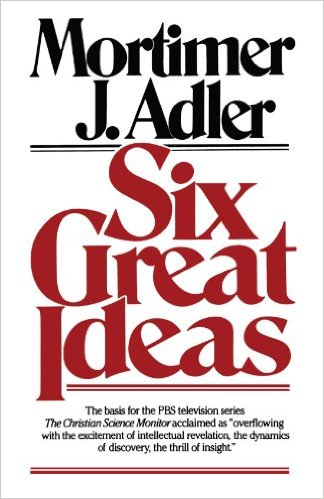|
Word Gems
exploring self-realization, sacred personhood, and full humanity
Dr. Mortimer J. Adler's
Six Great Ideas
|
The Freedom to Do as One Pleases, Part II: Liberty versus License
|
return to 'Six Great Ideas' main-page

|
Editor's note:
Excerpts from Six Great Ideas are offered below, indented format; plus, at times, my own commentary.
|
Our circumstantial freedom consists in our being able to do
as we please—our ability to carry out in overt action the deci-
sions we have reached, to do as we wish for our individual
good as we see it, rightly or wrongly.
Such freedom can be possessed and exercised by individuals
of good or bad moral character. The individual's free choice of
a line of conduct to pursue, or his decision about a course of
action to take, may be morally virtuous or the opposite, but in
either case, circumstances either permit him to behave or act as
he wishes, or prevent him from doing so. Accordingly, the
individual is either circumstantially free or unfree.
Our natural or inherent freedom of will confers upon us the
power to choose otherwise—to make, on a particular occasion,
a choice different from the one we made. Our circumstantial
freedom of action, when we possess it in the fullest measure,
confers upon us the ability to act otherwise. We are not only
left free by favorable circumstances to enact the choice we
made; we are also left free to enact a different, or opposite
choice, had we made it.
An individual in prison or in chains is circumstantially free
to remain in his cell or manacled, should that be his choice. But
bars or chains prevent him from going elsewhere or doing oth-
erwise if he wishes to. The restraints imposed by imprisonment
impair his freedom of action, not his freedom of choice, and
not his moral liberty—his freedom to will as he ought.
Two extraordinarily wise and virtuous human beings attest
to this striking fact. The Roman Stoic philosopher Epictetus
regarded himself as a free man, in the sense of having moral
liberty, even though he was a slave in chains. So, too, the
Christian philosopher Boethius eloquently celebrated his moral
freedom in a discourse that he wrote in prison.
Subhuman animals can have or be deprived of circumstantial
freedom, even though they do not possess either freedom of
choice or moral freedom. Penned up in cages or enclosures,
their scope of action is severely limited. They are prevented
from carrying out their instinctive impulses or acting in accor-
dance with tendencies that have been acquired through condi-
tioning. Freedom of choice and the freedom to will as one ought
are, therefore, not antecedent factors indispensable to freedom
of action.
Of these three major forms of freedom or liberty, the only one
that needs to be regulated by justice is the third—the circum-
stantial freedom to do as one pleases. What one wishes to do
may be injurious to someone else. It may be an action in viola-
tion of a just law. It may be contrary to the best interests of the
community of which the individual is a member.
Using the word “license" to designate an illegitimate, unlaw-
ful, or unjust exercise of one's circumstantially conferred ability
to do as one pleases, doing as one pleases, when so doing is
illegitimate, unlawful, or unjust, is not liberty, but license. To
think otherwise, or to demand that the scope of one's circum-
stantial freedom shall be unlimited by such considerations, is
to ask for an anarchic liberty, not a freedom that is consonant
with living in society cooperatively with other human beings.
Instead of using the word "freedom" for such anarchic liberty
—the liberty of an individual in a state of nature rather than of
society—let us refer to it as autonomy. Autonomy, as the ety-
mology of that word plainly indicates, consists in being a law
unto oneself.
Only an absolute sovereign has autonomy—obeys himself
alone, submits to no law made by others, recognizes no author-
ity to regulate his conduct. Autonomy can be possessed only by
individuals living completely solitary lives, not by them as
members of organized societies that cannot endure or prosper
without effective government or coercively enforceable laws.
Since individual human beings do not lead completely soli-
tary lives, since they have never existed, at least not for long, in
the so-called state of nature that is more accurately referred to
as a state of anarchy, the only autonomy to be found in the
world is that possessed by sovereign princes or states. The con-
sequences of such autonomy, as we so well know to our dis-
tress, is a state of war—the cold war that is the opposite of
peaceful coexistence even when it does not issue in military
action.
Living in organized societies under effective government and
enforceable laws, as they must in order to survive and prosper,
human beings neither have autonomy nor are they entitled to
unlimited liberty of action. Autonomy is incompatible with or-
ganized society. Unlimited liberty is destructive of it.
It is for this reason that the distinction between liberty and
license cannot be dismissed or disregarded. When that distinc-
tion is understood and accepted, it follows that the individual
who is prevented from doing what he pleases by just restraints
suffers no loss of liberty.
|
